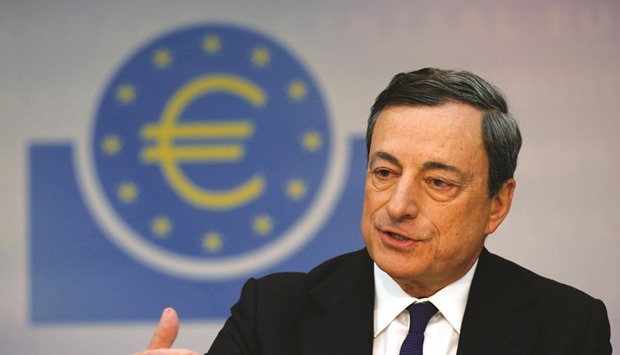Mario Draghi’s boost to European corporate bonds may end as quickly as it began.
The European Central Bank (ECB) on Thursday announced wider-than-expected criteria for a debt-buying programme, sparking a drop in credit risk and giving a second wind to the biggest corporate-bond rally in more than three years. Some money managers are beginning to ask whether the gains can last given the challenges the central bank faces buying significant amounts of debt in an illiquid market.
“Expectations for what the ECB will actually deliver still seem stretched,” said Alex Temple, a London-based fund manager at ECM Asset Management, whose parent Wells Fargo Asset Management oversees $480bn. “The easy money was made in March.”
The central bank has stoked concern about its ability to buy corporate debt by noting that the securities are “not very liquid or large.”
The April 7 comments cooled the market surge, which began a month earlier when the ECB first said it would widen stimulus measures to include company bonds.
“We’ve had such a big rally in such a short period of time that chasing returns here makes no sense,” said Geraud Charpin, a portfolio manager at BlueBay Asset Management in London, which oversees $58bn. “There are already signs it’s running out of steam.”
Charpin said he is short credit using both derivatives and cash bonds because he expects the ECB’s purchases will be smaller than anticipated and outweighed by new issuance.
The central bank will also make bonds even harder to trade and it isn’t going to be a buyer when investors most need to sell, for example, during a rout or outflows, he said.
Euro notes from investment-grade non-financial companies returned 1.6% last month, the most since July 2012, based on Bank of America Merrill Lynch index data. The gains slowed this month, and the notes have lost 0.2% since yields fell to an about one-year low on April 7.
The European Central Bank’s June entrance into the market may still be enough to spur further gains, given the size of its potential purchasing power, said Gordon Shannon, a portfolio manager at TwentyFour Asset Management, which oversees £6bn ($8.6bn).
The bank’s list of eligible bonds includes notes from the local units of companies based outside the euro area. It also covers debt ranked investment grade by only one credit-rating company.
“Even though we’ve come a long way, I think spreads will grind tighter as the buying starts,” Shannon said. “The ECB has to show they’re there to step in when spreads bounce back. I don’t think they will allow there to be any kind of a rout.”
The central bank will consider buying as much as 70% of each corporate issue, and will look at notes with maturities ranging from six months to 30 years. It won’t buy bonds issued by banks.
Still, the recent market gains have stoked memories of a similar rally about a year ago, which quickly turned into losses amid signs of inflation. Draghi offered investors little reassurance, saying they should “get used” to volatility because very low interest rates can exacerbate price swings.
Investors ended the year with losses from investment-grade corporate bonds in euros for the first time since 1999, Bank of America Merrill Lynch index data show.
“We’re in the same situation as last year and the question is, will investors heed the lesson?” said Wolfgang Kuhn, head of euro fixed income at Aberdeen Asset Management, which manages about £291bn of assets. “There may be volatility, and liquidity is so bad, that it means moves could be quite violent.”

Draghi: Offering little reassurance to investors.
